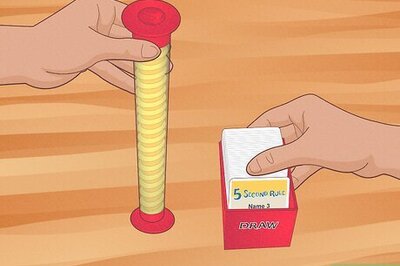
views
BANGALORE: Of late, beggars and the issue of begging in Bangalore are proving to be a big headache for the authorities as well as the citizens. We encounter them frequently be it while shopping on Brigade Road or Bull Temple Road or even at any traffic signal. They follow anybody who is close and keep pestering him or her till he or she gives that person some coins out of sheer disgust and helplessness.However, there is one institution in the city called the ‘Beggars Home’ maintained by the Nirashritara Parihara Kendra at Magadi road, which has been successful in curbing the menace but only to some extent. However, more can be done if only the resources are fully utilised. Although, the Beggar’s Home has a capacity to house 700-800 inmates, at present, they have only 500 members even as the city is crawling with beggars.Justifying this, Social Welfare officer, Ravi Kumar, says, “The beggars in the city have a well-established network. By the time, our van leaves one point and reaches another, they disappear.”The beggar’s home receive an annual fund of Rs 10 crore which is paid by different Panchayats in Karnataka through a three per cent cess. An institution which is financially so sound still has been lagging behind in mitigating this social problem in the city of Bangalore.Sporting a new look: It is often said, “It is better to be a beggar than a buried emperor.” This statement holds its weight in the beggar’s colony which is situated on the outskirts of the city. On visiting this colony, the stereotype of dirty beggars and the assumption of dirt and squalor are sure to vanish.In the aftermath of death of many beggars under mysterious circumstances in 2010, the beggar’s home has now been completely renovated. The house not only provided beggars with all the basic facilities such as drinking water, three meals a day, safety and security but also trains them in carpentry, soap making and candle making. Such skills are provided hoping that they will make use of these skills once they are released. Ravi Kumar, the Social Welfare officer of the colony says, “There are over 500 beggars living in this house, who are rehabilitated so as to get rid of their addiction to begging. Out of the 500 inmates we have, more than 70 per cent of them are from different states and 30 per cent from Karnataka.”One of the striking features that we came across was that out of 500 inmates, 300 were suffering from mental disorders. Ravi says, “We are providing these inmates professional help as well as regular medication. Apart from mentally ill patients, the remaining of the inmates are alcohol addicts. We are trying to rehabilitate them as well.”The management in the Beggar’s Home contended that if at all there is a misunderstanding while arresting a person, he will be released with immediate effect. However, Raju added, “I have spent two years in this colony. I still don’t know why they have brought me here. They have trained me in so many skills but they are not releasing me. Even though this place provides so much I still hate to be here. Life here is just like living in a jail where we have no freedom.” Greed often brings the worst in us, but when greed and addiction combines, it could lead to extreme measures. The colony offers treatment mainly to mentally ill patients and alcohol addicts. Ravi Kumar, Social Welfare Officer says, “The alcoholics in this home are in minority and they are considered as abled men. They can be trained in various skills.” One among the abled fellows is Nagraj. The 48-year- old is from Kolar District from a small town called Malur. He has been staying in the house for six months fighting his addiction. He says, “I used to drink every day. I didn’t know when to stop. I studied only till third standard and the loss of my wife made things worse for me.” In a choked voice, Nagraj adds, “I have two kids who are very young. I can’t afford to put them in school. It has been so long since I saw them. Presently, my sister is taking care of them, but I want to get them back soon.” Looking at the brighter side of things, Nagraj is recovering from his addiction and claims he is a changed man today. He says, “I am learning to fight my addiction in this Home. They provide us with good food and stay. Apart from that, we learn to live like brothers here. I no longer feel tempted to drink. I have realised the price I paid for it.”Immediate attention: Although Ravi Kumar pointed out to City Express that the inmates are trained in various vocational activities, it is to be noted here that out of 500 members only 30-40 of them are receiving such training. To top it all, there is a lack of trainers corresponding to the number of inmates present in the colony.One of the most striking features that came to light during our visit to Beggar’s Home was that most of them are habitual offenders. Ravi says, “Even after a year of recreation and training on different vocations, once they are released, most of them head straight back to the same place where they usually beg.” Here, begging sounds more of a profession and a privilege than a social crime for those involved in it. Dr Kishore Kumar who visits the Beggar’s home twice a month throws light on the subject and says, “For the people involved in begging, it is recourse to poverty and this is a concept that holds true in their minds. Although a few of them get vocational training, there is lack of continuity after their release which is the need of the hour. They do not know where to go and utilise their skills even if they want too. For a few days, they might shield away from begging but when hunger calls this is the only thing they know, how to do best. There is no proper infrastructure for their training, be it at the beggar’s home or anywhere else. Here, we would like to state that in 2006-07, the state government passed an order stating that transgenders will get Rs 1,000 as aid. However, most of them never applied for it nor did they avail it. They contended that they can earn that minimal amount of Rs 1,000 in a day. Hence, they don’t need any doles from the government.The government should address their issues through case studies. ” He further added, “There are many things such as urban housing and rehabilitation which are very complex and I think nothing much has been done for them. The beggars have every right to contend that they don’t have any money and so, would like to beg. But, there must also be a drastic change in the cultural beliefs of our society which is ready to give alms at the drop of a hat.”Different forms: Begging is done in different forms in the city. There are children and adults who are on the streets trying to sell flowers and toys, but once you refuse to buy, they start begging. Another set of beggars are comparatively well dressed and beg for money stating their various forms of illnesses. Last but not the least are the eunuchs who are scattered all over the city and at times turn violent if anybody denies them alms.Helpline: Beggar’s Home will make use of technology soon. The first step will be launching their website. However, at present there is a helpline where people can report the presence of adult and professional beggars to the concerned authorities at 080-23481580.













Comments
0 comment